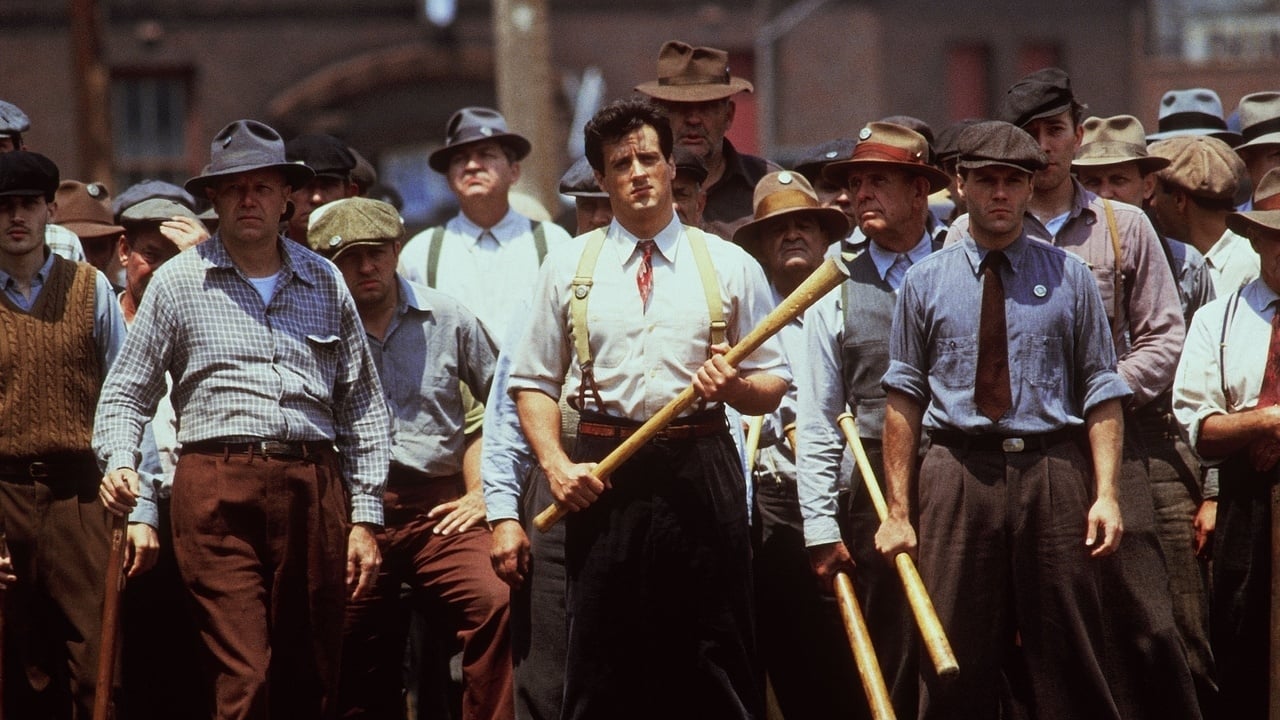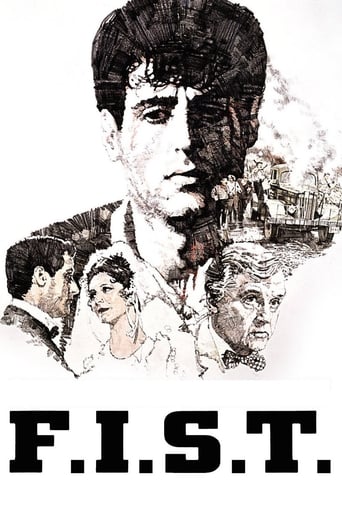

This is a movie about worker's right against owners. This is a movie about slaves protesting their utter humiliation against owners, whose abominations know no end. This is a movie about power-society.What is the solution against people who think it's all-right that they have everything while others have nothing? What is the solution against people who look at you as if you were vermin, since there is no other way they could look at you when they think it is quite OK that they have everything and you nothing? The Nazi's looked at the unfortunate Jews (the rich ones were in USA and did not have a record of outdoing themselves for their racial brothers - look at "Amen" by Costa-Gavras) as vermin and as long as they could look at their brothers human beings that way, they had no trouble to exterminate them. Some realized their mistake and killed themselves afterward.Will the owners realize their mistake? Don't count on it, as this movie shows! Violence give rise to counter-violence if you cannot activate a whole population as in Venezuela or Gandhi's India. Yes, if the owners will have the whole population rise against them, they may, paradoxically, survive! If they just get a sufficient large minority against them, they will have the French Revolution and will maybe not survive. I guess they haven't thought of that one - or maybe they have, if you consider recent developments.There's no difference in what you take with you when you leave this world abut a giant difference in what you leave behind.
... View MoreNorman Jewison mangles history with "F.I.S.T", a simplified retelling of the life of Jimmy Hoffa. Like certain mainstream directors (Spielberg, Kramer, Zwick, Stone, Kazan, Joffe, Sayles), Jewison has a habit of making self important message movies which pretend to be about big, weighty topics (race, slavery, holocaust, racism, politics etc), but which completely avoid or deal superficially with the issues at hand. Here Jewison has actor Sylvester Stallone (who co-wrote the screenplay) star as Johnny Kovak, a blue collar worker who inspires other working class men to organise, unionize and stand up against exploitation.The film charters Kovak's rise through the union ranks, until he reaches a position of power. With this power comes corruption, the film's union leaders eventually becoming as greedy as those they fight against. Oddly, the film focuses on Teamsters and truckers, the one labour force that even today retains some semblance of individualism, relatively insulated from capital's encroachments.Like most of these films ("Blue Collar", "Matewan", virtually every Hollywood "slave revolt" movie etc), "F.I.S.T" quickly runs away from actual labour. The structure of labour is avoided in favour for delving into corruption, the implication being that work is fine, so long as your boss is nice, doesn't beat you and pays well.Politics are thrown out the window as well. "Bolsheviks? What are they?" Stallone asks, the film ignoring the vast communist contributions to the formation of unions and the organisation of the working class (something Sayles, Loach and Rosi get right). As the "C-word" is ignored, an important part of Hoffa's history – his purging of all communists and Trotskyists – is likewise wiped away.What the film does get right is the corruption which soon infected big unions. By the time they had gained a foothold, most of the unions became as corrupt as any other US institution, loose federations of unions quickly becoming tightly controlled, centralised domains. Partially as a response to this, mega-businesses then turned to offshore, outsourced labour. Aesthetically the film is all over the place. Though gorgeously shot by the legendary Laszlo Kovacs, Jewison's tone is customarily unsophisticated. This is a film of mouthpieces, cardboard cutouts and an obvious, reductive plot. The acting is likewise mostly dead, especially Stallone. Stallone specialises in working-class roles, fantasies about escaping the working class whilst pretending that you've never left it behind. Here his character calls for an intelligence (or rather, a street smarts) which he can't quite manage. "F.I.S.T's" narrative trajectory is "Rocky's" 1 and 2 combined, but it requires a triple digit IQed hero. Stallone may be smart, but he can't act smart. His Johnny Kovak doesn't convince.Ultimately, depressingly, "F.I.S.T's" a film about the working class betraying itself. It neglects, however, the causes of self betrayal. The implication therefore is that if one were to remove corrupt individuals from unions, then one would have healthy unionism. And with healthy unionism, it is then assumed, one would have healthy capitalism. What you're stuck with, therefore, is a kind of early Marxism; the conservative slogan "A fair day's wage for a fair day's work", which Marx himself long replaced with "Abolish the wages system." Beyond this, what is needed are not films which charter historical and class movements, but those that delve into the drives and unconscious currents which perpetuate these problems. It's no point overthrowing power if you merely take its place. Or, to paraphrase a famous slave owner, "the white man didn't subject the African to depravity, he beat him to it."7.5/10 - Great directors know how to approach topics tangentially. Once you start preaching, your art immediately becomes obvious and reductive. Some films which get away with similar preaching: "Matewan", "Burn!", Wajda's "Man of Iron" and Francesco Rosi's "The Mattei Affair" and "Lucky Luciano". Otherwise you have the neorealists. David Mamet's "Hoffa" - very similar to this film - was released in 1992.Worth one viewing.
... View MoreFIST is a fictional biopic of a fictional organized labor leader, played by Sylvester Stallone.The movie is split into two, with the first half following the rise of a food-packer named Kovacs (Stallone), to trucking local union organizer in the pre-war midwest, ostensibly Cleveland. The second half follows the growth of the union into a national behemoth in a post-war period of organized crime involvement and congressional investigation.This is a very convincing, beautifully shot period film, from the factories to the clothes to beautiful examples of period vehicles. Stallone's character delivers textbook instruction on how to motivate a crowd, strike, and hardball negotiate.Kovacs grows into middle-age and the compromises he's made earlier with the mob come back to bite him, attracting the attention of an anti-mafia senator, played coolly but fiercely by the great Rod Steiger in a role reminiscent of Robert Kennedy's time as attorney general.FIST is a great film which condenses decades of American history into two hours, and gives a balanced overview of the battle between labor and capital. The first half is totally sympathetic to labor, and makes management look purely evil, but the second half shows the corruption from within of the labor movement, and of any movement that succeeds. It shows how the leaders who scrapped together in the streets eventually are forced to turn on each other. At the start, the enemies are the factory-owners, later the enemies are the associates who were let in the back door. Of course, 30 years later, FIST has a different reference, almost as a period piece when labor had any power whatsoever.FIST was made four years after Godfather II, and 12 years before Goodfellas, which closely share its biopic rise and fall structure.FIST is a great movie in the tradition of classic Hollywood, a huge time-spanning spectacle that is tightly written, shot, and acted. Equally importantly, FIST gets to the core and contradictions of being a worker, a leader, or a boss, and the many conflicts therein.
... View MoreJimmy Hoffa and the Teamsters are such an important part of America they deserve their own genre. So far, there's Hoffa, Blood Feud and Fist. Sylvester Stallone was of one of three great actors privileged to play the Hoffa character, although in this movie Hoffa is hidden under the name Kovacs.This movie is really two separate tales: The Rise and Fall with 20 years lost in between.We start at the beginning of the labor troubles: the unions are organizing to protect worker's rights; management is resisting; management openly prays for Douglas Macarthur to seize power and re-play the Key Memorial Bridge incident.Johnny Kovacs needs a little push of his own to make the strike effective and to get the first contract. Behind the back of Abe Belkin his partner in unionizing the truckers, Johnny sells his soul to the mob. "We had something good, Johnny?" pouts Abe at Johnny's wedding.Abe sticks with the union but heads out west.We jet ahead into the future where Johnny has seized control of the union at the national level and pensioned off the former corrupt bosses but will all the deals he made bounce back at him to destroy Johnny Abe and the union they founded.Sly Stallone renders a bravura performance in an excellent story well told.
... View More